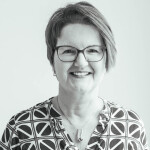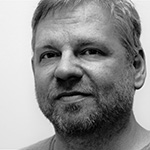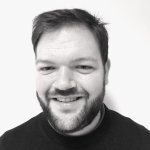TML'ers have their say! #8
In this section we would like to introduce you to our colleagues at TML. That way you get to know us a little better and discover what everyone at TML does. Recently we had a conversation with Bart, Roeland, and Inge!
Welcome everyone! Tell us, how did you end up at TML?
Bart: I worked at Fedasil as a data analyst and was looking for a job with more substantial research and study work. I had applied for a vacancy at TML a year earlier, but this job then went to someone else. A year later, however, I received an e-mail from Griet, asking if I still wanted a job at TML. After the interview I could start right away.
Roeland: I already knew Griet from a course she taught during my studies (Master in Mobility & Supply Chain Engineering); she had indicated that a vacancy was available. At the time, I was still in doubt whether I should continue my studies or go straight to the job market. I then decided to start working at TML. What particularly appealed to me was the more quantitative approach, the theoretical aspects of the study work, and the practical implementation.
Inge: I used to work at VITO, when Griet and Stef (who was the supervisor of my PhD) contacted me. After that conversation, TML seemed like an interesting company. The project I could start working on was new and exciting: sustainable fuels in aviation. And that in an environment like that of TML, where people are quite proactive.
What interesting journeys! What are your backgrounds?
Bart: I played with the youth of KVK Tienen with ambitions as a football player. I then had the plan to combine football and studies; so I graduated as an industrial engineer in Electronics at Group T. That gave me some time to train and study. I quit the sport when I was 20 due to an injury. After my studies I helped to expand the network in the early years of Proximus. In evening classes I followed psychology at the VUB. That seemed interesting to me, and I was able to do it completely after work. After I completed my candidacy, I went to the KU Leuven for the master's degree in experimental psychology. This was only possible in daytime education and forced me to work part-time. After my studies, I exchanged my job at Proximus for a PhD in visual perception. I stayed on at university, including in the PSI, Electrical Engineering department, where I worked on learning algorithms for speech technology.
Roeland: I started as a Bachelor of Civil Engineering, option Mechanical Engineering; this seemed to me the best preparation, in combination with business management, to be able to do the Master afterwards. I found the one around Traffic & Logistics very interesting; traffic (and by extension traffic modelling) has always appealed to me. For example, when I was young and we went on a trip, I drew up the routes. Traffic is fascinating, you come into contact with it on a daily basis, and I also find the mathematical aspect of it interesting.
Inge: When I graduated from the humanities, I found many specialisations interesting. I then spoke to some people, and it turned out that Economics was a direction for me. I therefore first did Applied Economics at the University of Antwerp (UFSIA), and then completed the Master of Arts in Economics in Leuven. After that I was able to work with Stef Proost as a scientific assistant on environmental and transport economics, which also gave me the opportunity to do a PhD in Economics. At the time, this was about the external effects of transport and general equilibrium analyses of measures to reduce these external effects.
All this shows strong ambitions. Tell me, what are your daily activities at TML?
Bart: On the one hand, I do projects that are more research-oriented, such as CITRUS and InterCor, where interesting data analyses are performed, and where you can be inventive to find suitable solutions to real problems in real field experiments. In addition, I also worked a lot on the ConACon project: it was a challenge to find the balance between diving deep into something and still keeping an eye on your available time. I learned to work with the microscopic traffic simulator SUMO. In this way I also learned a lot about traffic models, which was new territory for me. In addition, I also gained insight into the limits of model predictive control in the context of the simulation of traffic management measures. Another large part of my work is working on the elaboration and follow-up of the tenders for the traffic management systems of the cities of Leuven, Vilvoorde, and Mechelen. It is exciting to do market research, and to make an estimate in terms of technology, which then results in drawing up a tender to help a city with the best value-for-money purchase. I also work as a data analyst for a series of other projects, follow up the nuMIDAS project, programmed a tool for the Flemish Node Monitor with associated database analyses. I have a good foundation in statistics and like to do analyses of experiments, (geospatial) analyses, survey research, etc.
Roeland: I worked on the Namen-Eupen project where we made a four-step model, which will later be used for emission-related calculations. In concrete terms, I worked out the demand modelling in it, and I also thought about the various ways to build the model. On a regular basis I also do microscopic traffic simulations in VISSIM. For example, I have drawn up and simulated various alternatives for the A12 and viewed and interpreted the results. Analogously, I contributed to the R0/A201 Vilvoorde, and I did some smaller mobility studies, including mobility impact assessments (MOBERs). Besides programming, I like the variety between the projects; for example, I also helped with some economic studies such as the PTW study.
Inge: For the European Environment Agency (EEA) I contribute to the annual TERM report (TML is the task manager for this) and I study the purchasing behaviour of new vehicles. I also work on the EPOC project on long-term prospects for energy and transport and I perform cost-benefit analyses of infrastructure projects. My approach is increasingly economic, with social cost-benefit analyses, evaluations of all kinds of policies, and that in a mix of national and international studies. Besides overview reports, I also find the empirical work interesting; you can dive more generally into a domain and look at trends. Moreover, it is the combination of certain things that makes the work fascinating. A very nice project I found, for example, is our work for SmartMove; it was a pleasant collaboration with the client, and a socially very relevant project.
Your job satisfaction radiates from you, what a varied activities! And now we are also curious about what is happening in your life outside of TML?
Bart: Besides being a father, I sometimes also support my wife's business. She owns a shop where she sells local food products. Fair Trade and packaging-free products (where you bring your own jars to replenish) are also sold. I also like to go hiking. For example, I am also member of an association that aims to open access to public municipal roads for which access is hindered by private owners. We base this on official documents; these are well-described roads that have all been given numbers and names. Those documents still serve as a reference according to the law for locating municipal roads (neighbourhood roads) on private property. Everyone can walk there.
Roeland: I have been very active in tennis since I was 16: I give tennis lessons, I am chairman of our tennis club TC Roosendael, and I am an international referee. Last summer I was away for about ten weeks. Every now and then I play a bit myself and I also try to cycle more, for example to and from work. I used to play football and am eagerly looking forward to the TML afternoon football sessions.
Inge: I like walking very much. As soon as I can go back, I also like to make longer trips (such as to India for example); Corona has put a stop to that in recent years.
Thank you for your time. It was really interesting to have this conversation with you!
Welcome everyone! Tell us, how did you end up at TML?
Bart: I worked at Fedasil as a data analyst and was looking for a job with more substantial research and study work. I had applied for a vacancy at TML a year earlier, but this job then went to someone else. A year later, however, I received an e-mail from Griet, asking if I still wanted a job at TML. After the interview I could start right away.
Roeland: I already knew Griet from a course she taught during my studies (Master in Mobility & Supply Chain Engineering); she had indicated that a vacancy was available. At the time, I was still in doubt whether I should continue my studies or go straight to the job market. I then decided to start working at TML. What particularly appealed to me was the more quantitative approach, the theoretical aspects of the study work, and the practical implementation.
Inge: I used to work at VITO, when Griet and Stef (who was the supervisor of my PhD) contacted me. After that conversation, TML seemed like an interesting company. The project I could start working on was new and exciting: sustainable fuels in aviation. And that in an environment like that of TML, where people are quite proactive.
What interesting journeys! What are your backgrounds?
Bart: I played with the youth of KVK Tienen with ambitions as a football player. I then had the plan to combine football and studies; so I graduated as an industrial engineer in Electronics at Group T. That gave me some time to train and study. I quit the sport when I was 20 due to an injury. After my studies I helped to expand the network in the early years of Proximus. In evening classes I followed psychology at the VUB. That seemed interesting to me, and I was able to do it completely after work. After I completed my candidacy, I went to the KU Leuven for the master's degree in experimental psychology. This was only possible in daytime education and forced me to work part-time. After my studies, I exchanged my job at Proximus for a PhD in visual perception. I stayed on at university, including in the PSI, Electrical Engineering department, where I worked on learning algorithms for speech technology.
Roeland: I started as a Bachelor of Civil Engineering, option Mechanical Engineering; this seemed to me the best preparation, in combination with business management, to be able to do the Master afterwards. I found the one around Traffic & Logistics very interesting; traffic (and by extension traffic modelling) has always appealed to me. For example, when I was young and we went on a trip, I drew up the routes. Traffic is fascinating, you come into contact with it on a daily basis, and I also find the mathematical aspect of it interesting.
Inge: When I graduated from the humanities, I found many specialisations interesting. I then spoke to some people, and it turned out that Economics was a direction for me. I therefore first did Applied Economics at the University of Antwerp (UFSIA), and then completed the Master of Arts in Economics in Leuven. After that I was able to work with Stef Proost as a scientific assistant on environmental and transport economics, which also gave me the opportunity to do a PhD in Economics. At the time, this was about the external effects of transport and general equilibrium analyses of measures to reduce these external effects.
All this shows strong ambitions. Tell me, what are your daily activities at TML?
Bart: On the one hand, I do projects that are more research-oriented, such as CITRUS and InterCor, where interesting data analyses are performed, and where you can be inventive to find suitable solutions to real problems in real field experiments. In addition, I also worked a lot on the ConACon project: it was a challenge to find the balance between diving deep into something and still keeping an eye on your available time. I learned to work with the microscopic traffic simulator SUMO. In this way I also learned a lot about traffic models, which was new territory for me. In addition, I also gained insight into the limits of model predictive control in the context of the simulation of traffic management measures. Another large part of my work is working on the elaboration and follow-up of the tenders for the traffic management systems of the cities of Leuven, Vilvoorde, and Mechelen. It is exciting to do market research, and to make an estimate in terms of technology, which then results in drawing up a tender to help a city with the best value-for-money purchase. I also work as a data analyst for a series of other projects, follow up the nuMIDAS project, programmed a tool for the Flemish Node Monitor with associated database analyses. I have a good foundation in statistics and like to do analyses of experiments, (geospatial) analyses, survey research, etc.
Roeland: I worked on the Namen-Eupen project where we made a four-step model, which will later be used for emission-related calculations. In concrete terms, I worked out the demand modelling in it, and I also thought about the various ways to build the model. On a regular basis I also do microscopic traffic simulations in VISSIM. For example, I have drawn up and simulated various alternatives for the A12 and viewed and interpreted the results. Analogously, I contributed to the R0/A201 Vilvoorde, and I did some smaller mobility studies, including mobility impact assessments (MOBERs). Besides programming, I like the variety between the projects; for example, I also helped with some economic studies such as the PTW study.
Inge: For the European Environment Agency (EEA) I contribute to the annual TERM report (TML is the task manager for this) and I study the purchasing behaviour of new vehicles. I also work on the EPOC project on long-term prospects for energy and transport and I perform cost-benefit analyses of infrastructure projects. My approach is increasingly economic, with social cost-benefit analyses, evaluations of all kinds of policies, and that in a mix of national and international studies. Besides overview reports, I also find the empirical work interesting; you can dive more generally into a domain and look at trends. Moreover, it is the combination of certain things that makes the work fascinating. A very nice project I found, for example, is our work for SmartMove; it was a pleasant collaboration with the client, and a socially very relevant project.
Your job satisfaction radiates from you, what a varied activities! And now we are also curious about what is happening in your life outside of TML?
Bart: Besides being a father, I sometimes also support my wife's business. She owns a shop where she sells local food products. Fair Trade and packaging-free products (where you bring your own jars to replenish) are also sold. I also like to go hiking. For example, I am also member of an association that aims to open access to public municipal roads for which access is hindered by private owners. We base this on official documents; these are well-described roads that have all been given numbers and names. Those documents still serve as a reference according to the law for locating municipal roads (neighbourhood roads) on private property. Everyone can walk there.
Roeland: I have been very active in tennis since I was 16: I give tennis lessons, I am chairman of our tennis club TC Roosendael, and I am an international referee. Last summer I was away for about ten weeks. Every now and then I play a bit myself and I also try to cycle more, for example to and from work. I used to play football and am eagerly looking forward to the TML afternoon football sessions.
Inge: I like walking very much. As soon as I can go back, I also like to make longer trips (such as to India for example); Corona has put a stop to that in recent years.
Thank you for your time. It was really interesting to have this conversation with you!



